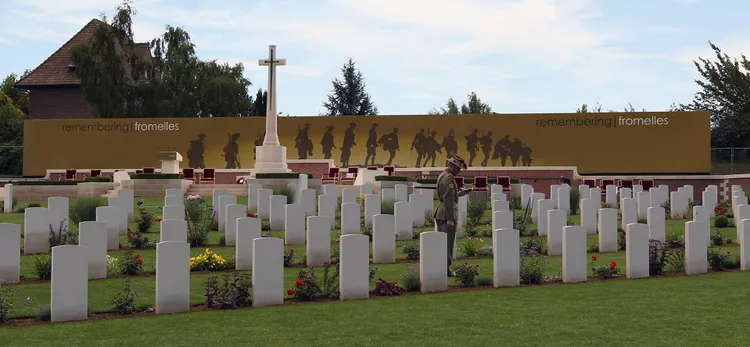Summary
How to Get There
The Lille-Lesquin Airport is located about 5 miles from the center of Lille. An airport shuttle (from door A) gets you into the center of Lille in approximately 20 minutes.
France boasts an extensive rail system, and Lille features two train stations situated 400 meters apart. The Lille Flandres station provides TER regional trains and direct TGV service to Paris, while the Lille Europe station offers Eurostar service to London and Brussels, along with TGV service to Roissy Airport, Paris, and other major French cities.
Visiting World War I Battlefields Around Lille
Lille, as the first stop on the French side of the Channel Tunnel, is an excellent location if you are primarily interested in exploring the World War I battlefields. However, there are additional areas you may want to consider. For instance, Arras, located an hour from Lille and without direct train access, is slightly closer to many significant battlefields. Meanwhile, Bruges in Belgium also offers WWI battlefield tours. Additionally, you could explore a two-day battlefield tour from Paris for a comprehensive experience.
Here are some of the primary battlefields near Lille:
- Somme: This battlefield represents the largest battle on the Western Front, resulting in nearly one million casualties. Situated about an hour’s drive from Lille, you can pay tribute to the fallen on this Somme Battlefield Tour.
- Fromelles: This location witnessed the deadliest battle in military history involving Australian forces. More information is available through the Battlefield Tour of Fromelles and Flanders.
- Vimy Ridge: Known for being a triumph for Canadian troops, you can learn more via the Vimy Battlefield Tour from Lille.
- Ypres: Famously referred to as “Wipers” by soldiers, this renowned battlefield lacks a direct tour from Lille but is accessible from nearby Arras through the Ypres Tour from Arras.
About the Battle of Fromelles
The Battle of Fromelles, located near Lille, marks the first major conflict on the Western Front for Australian troops. It is deemed the bloodiest 24 hours in Australian military history. In the night of July 19, 1916, there were 5,533 Australians and 1,547 English soldiers wounded or reported missing. The memorial honoring Australians can be visited here. The German side experienced approximately 1,600 casualties.
This battle is often viewed as both tragic and unnecessary. Primarily, it served as a diversion for a substantial offensive occurring in the Somme, roughly 50 miles to the south. Ultimately, it yielded neither tactical advantages nor effective long-term benefits.
More Things to Do in the Area
Lille is celebrated for its narrow, cobbled streets brimming with Flemish architecture, animated cafes, and upscale restaurants. It was recognized as the “European City of Culture” in 2004.
Make sure to visit Lille’s Gothic Cathedral, the impressive collections of 15th- to 20th-century paintings at the Musée des Beaux-Arts de Lyon, noted as the second most significant art museum after the Louvre in Paris, and the iconic Place du Général de Gaulle, or Grand Palace.
For a unique viewpoint of Lille, ascend the belfry stairs for breathtaking views. Alternatively, take a stylish ride through the streets by booking a vintage 2CV convertible.
A fine example of Flemish baroque architecture by Julien Destrée is the Old Stock Exchange (Vieille Bourse).
The Hospice Comtesse Museum, which was established as a hospital in 1237 and remained functional until 1939, is another must-see. It offers insight into the lives of Augustinian nuns who cared for the sick, showcases art, and features a medicinal garden.
On the west side of Lille lies the Citadelle de Lille, built around 1668 by Vauban as part of the city’s fortifications. Although most of these fortifications were dismantled towards the end of the 19th century, the surrounding Bois de Boulogne is popular among walkers and families, boasting a well-managed zoo, Parc Zoologique, nearby.
For shopping enthusiasts, a visit to the Center Commercial Euralille is recommended. Situated between the two train stations, this shopping center houses 120 shops, restaurants, and cafes designed by Rem Koolhaas in 1994.
Be aware that many museums in Lille are closed on Mondays and Tuesdays.
For a fascinating day trip from Lille, consider taking the train to the nearby town of Lens, home to the newly opened extension of the Louvre, known as Louvre-Lens.
Public Transportation
Lille offers two metro lines, two tram lines, and around 60 bus lines to facilitate travel. For tourists, acquiring a Lille City Pass may be the best option for transportation needs, as it grants access to 28 tourist sites and attractions, in addition to free public transportation. This pass can be obtained at the tourist office.
Office of Tourism
The Lille Tourist Office is located in the Palais Rihour at Place Rihour. Various tours are available through the tourism office, including a remembrance tour, city tour, bike tour, and guided walking tour of Old Lille. Reservations can also be made to climb the Town Hall Belfry for splendid views of Lille, along with Segway tours.
Christmas Market
Lille was the first city in France to establish a Christmas market, which operates from mid-November through the end of December. Stores remain open on the three Sundays leading up to Christmas, and the Lille Christmas market is situated in Rihour square.
Weather and Climate
Lille experiences a pleasant climate during the summer months, though occasional rain can be expected, intensifying in the fall. From June to August, daily highs are typically in the low 20s Celsius, translating to around 70°F.




